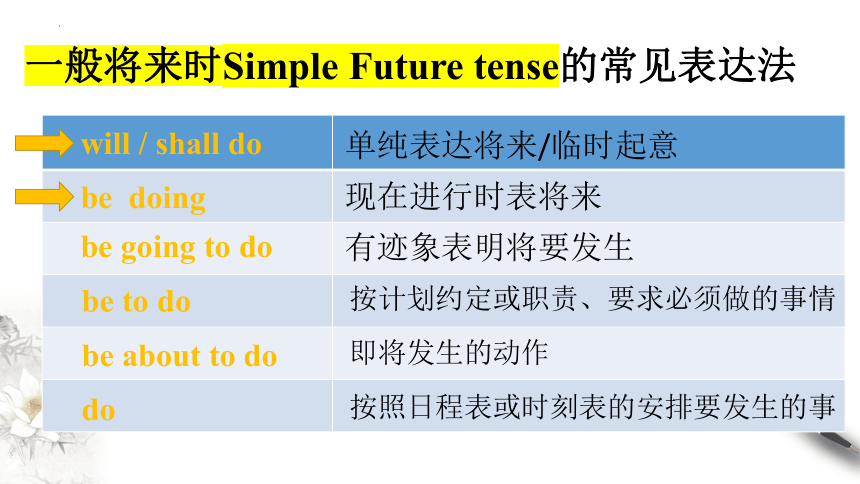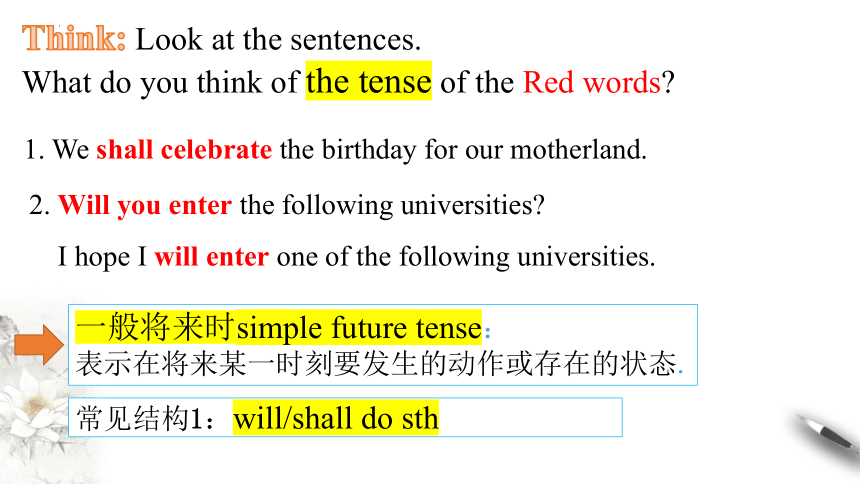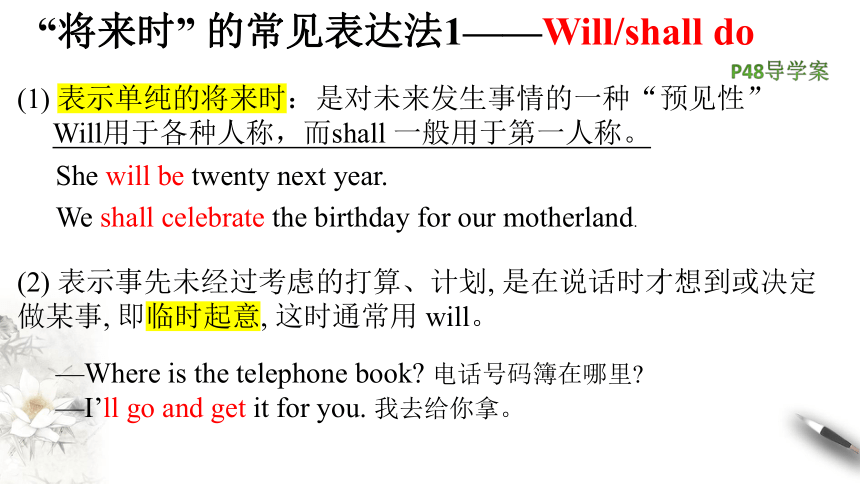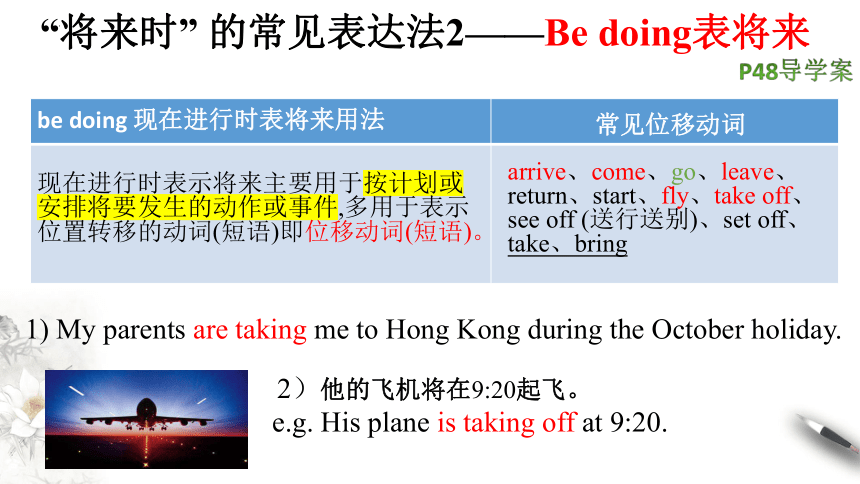人教版(2019)必修第一册Unit 2 Travelling Around Discovering Useful Structures 课件(共28张PPT)
文档属性
| 名称 | 人教版(2019)必修第一册Unit 2 Travelling Around Discovering Useful Structures 课件(共28张PPT) |

|
|
| 格式 | pptx | ||
| 文件大小 | 2.5MB | ||
| 资源类型 | 教案 | ||
| 版本资源 | 人教版(2019) | ||
| 科目 | 英语 | ||
| 更新时间 | 2024-07-23 00:00:00 | ||
图片预览









文档简介
(共28张PPT)
Discovering Useful structures
人教版 必修一 Unit2
一般将来时Simple Future tense的常见表达法
马上要发生的事
will / shall do
be going to do
有迹象表明将要发生
现在进行时表将来
按计划约定或职责、要求必须做的事情
be about to do
be to do
be doing
单纯表达将来/临时起意
do
即将发生的动作
按照日程表或时刻表的安排要发生的事
present
Lead-in: Look at the time axis
past
(10.18.2021)
(10.01.1949)
The People’s Republic of China was founded.
(10.01.2022)
We shall celebrate the birthday for our motherland.
future
Will you enter the following universities
Lead-in: Look at these pictures
I hope I will enter one of the following universities.
Guangzhou Higher Education Mega Center
一般将来时simple future tense:
表示在将来某一时刻要发生的动作或存在的状态.
2. Will you enter the following universities
I hope I will enter one of the following universities.
1. We shall celebrate the birthday for our motherland.
常见结构1:will/shall do sth
Think: Look at the sentences.
What do you think of the tense of the Red words
(1) 表示单纯的将来时:是对未来发生事情的一种“预见性”
Will用于各种人称,而shall 一般用于第一人称。
She will be twenty next year.
“将来时” 的常见表达法1——Will/shall do
P48导学案
We shall celebrate the birthday for our motherland.
(2) 表示事先未经过考虑的打算、计划, 是在说话时才想到或决定 做某事, 即临时起意, 这时通常用 will。
—Where is the telephone book 电话号码簿在哪里
—I’ll go and get it for you. 我去给你拿。
Learn:
Task 1:
What do you think the tense in the sentences expresses (p28)
1) I’m traveling around Europe for two weeks with my uncle and aunt.
=I will travel around to Europe......
3) My parents are taking me to Hong Kong during the October holiday.
2) We’re renting a car and driving!
=My parents will take me to ......
=We will rent a car and will drive!
结构be doing
will/shall do
现在进行时表示将来时
Talk about your future plans
1)根据语境来判断
e.g. His plane is taking off at 9:20.
2)他的飞机将在9:20起飞。
“将来时” 的常见表达法2——Be doing表将来
P48导学案
be doing 现在进行时表将来用法 常见位移动词
1) My parents are taking me to Hong Kong during the October holiday.
现在进行时表示将来主要用于按计划或安排将要发生的动作或事件,多用于表示位置转移的动词(短语)即位移动词(短语)。
arrive、come、go、leave、
return、start、fly、take off、
see off (送行送别)、set off、
take、bring
Amy: Hello, Jeremy!What are you doing this weekend
Jeremy:Hi, Amy! Some friends and I are going to that new water park on Saturday.
Amy:Sure, I’d love to ! What time and where
Jeremy:We’re meeting at 10:00am at the bus stop near our school.
Amy:How about lunch Are you eating there at the water park
Jeremy:Well, I am bringing my own lunch. I think some of the others are eating at the park, but the food there is really expensive.
Task 2: Underline verbs in the present continuous tense. (p28)
Learn:
are meeting;
are eating
一些非位移动词也可用Be doing表将来
哪些是位移动词呢?
位移动词组
位移动词
2)根据语境+时间状语来判断
“将来时” 的常见表达法2——Be doing表将来
P48导学案
be doing 现在进行时表将来用法 常见非位移动词
也可使用某些非位移动词(短语),句中一般要有表示将来的时间状语。 do、buy、meet、have、spend、play、finish、stay、publish
e.g.They are spending their next summer holiday
in Guilin.
他们会在桂林度过他们下个暑假假期。(spend)
Jeremy:We’re meeting at 10:00am at the bus stop near our school.
定义:表示不能延续的动作,这种动作发生后立即结束。
换句话说:这个动作一旦发生就意味着完成和结束,比如说take off、die。
He is dying. 他正在死?
He has died for three years.
这些动词所以不能与一段时间连用,不能表示持续一段时间。
也不能用于进行时态,但可以用现在进行时的结构be doing表将来,
表示这个动作还未发生或者即将发生,是未完成的状态。
He has been dead for three years.
他即将死亡。
3)根据动词是否为终止性动词来判断
终止性动词/瞬间动词
位移动词 非位移动词
终止性动词 部分属于终止性动词
arrive、come、go、leave、return、start、fly、take off、see off (送行送别)、set off、take、bring
buy、meet、finish、die、open、close、join
句中一般要有表示将来的时间状语。
1)根据语境来判断
2)根据时间状语来判断
3)根据动词是否为终止性动词来判断
如何判断这些词究竟是现在进行中还是表将来呢?
Task 3: Tick those that express future plan. Then, rewrite them in the present continuous tense. (tip: will/shall do Be doing) (p28)
1. I’ve just booked my air ticket!
I’ll visit my grandparents in December.
2. Gray might visit China next year,
but he’s still not sure.
3. Kate has been invited to a meeting in Iceland.
She will apply for a visa soon.
am visiting
is applying for
表说话人的推测,不属于当事人计划和打算要做的事情
4. Could you help me with this box, please
I’m afraid I’m going to drop it.
5. Hey, are you free for dinner tonight
B:I’m sorry, no. I’ll have dinner with
my cousins tonight.
am having
不在本人的意愿之内,不属于future plan
一般将来时Simple Future tense的常见表达法
马上要发生的事
will / shall do
be going to do
有迹象表明将要发生
现在进行时表将来
按计划约定或职责、要求必须做的事情
be about to do
be to do
be doing
单纯表达将来/临时起意
do
即将发生的动作
按照日程表或时刻表的安排要发生的事
“将来时” 的常见表达法3—Be going to do表将来
P48导学案
Jeremy:Hi, Amy! Some friends and I are going to that new water park
on Saturday.
4. Could you help me with this box, please
I’m afraid I’m going to drop it.
be going to
be going to
go—不及物动词: be going to(介词) +地点,位移动词属于be doing表将来。
与come相对应 e.g. I’m going to the school. I’m coming home.
将要做某事、将要发生某事: be going to(不定式) +do sth.
1. After graduation, they are going to set up a business of their own.
3. 明天天气很好很适合冲浪。
It for surfing tomorrow.
“将来时” 的常见表达法3—Be going to do表将来
P48导学案
Be going to do sth表将来 用法
(1) (人做主语)
打算、计划做某事
(2) (物做主语)
有迹象表明要发生某事
2. Well, it is going to be sunny in the morning.
is going to be a fine day
(7)—I after school. 放学后我打算去打篮球。
3.—What are you going to do tonight 今晚你打算做什么
— the baseball game on TV.(watch)我打算看电视上的棒球赛。
am going to play basketball
I am going to watch
导学案P49思学区上面第七题
导学案P49思学区部分完成句子第三题
Drills
1. My best friend is to be married in November this year.
2. You are to be back by 9’clock.
3. Your exam is to be a failure because of your laziness.
is to die
“将来时” 的常见表达法4—Be to do表将来
P48导学案
表示按计划约定的或责任duty、义务obligation、要求request必须去做的事或即将发生的动作,也可表示注定要发生某事。
按计划约定
按要求必须去做
注定要发生
4. Fish __________ without water. 鱼离开水注定会死。
(1)Tell her that she is not (be) back late.
告诉她,她不被允许这么晚回来。
(3)This naughty boy here until the class is over.
这个调皮的男孩必须待在这里,一直到下课为止
导学案P48变式训练2题
导学案P49(12)
to be
is to stay
Drills
The plane is about to take off.
I was about to go to bed when the telephone rang.
“将来时” 的常见表达法5—Be about to do表将来
P48导学案
表示即将发生的动作,意为“刚要做某事时”,“正要做”
句式:be about to do ….when… “正要做…….这时. (常用于过去将来时)
即将发生
刚要去床上睡觉
The programme is about to begin in ten minutes.
The programme is about to begin.
The programme is going to begin in ten minutes.
be about to do不与具体时间状语连用
一般现在时表示将来主要用于按照日程表或时刻表的安排要发生的事,如:火车/汽车出发、船只离岸、飞机起飞等。
常见的动词有go, come, leave, return, start, begin, end, open, close等。
begins
get
“将来时” 的常见表达法6— do表将来
P48导学案
1. The train leaves at 2:00 p.m tomorrow.
2. The library opens at 9:00 a.m. tomorrow.
3. The new term on September 1st.
用于条件或时间状语从句中, 此时主句用将来时(主将从现)。
4. If it is fine tomorrow, we’ll visit the Great Wall.
5. I’ll write to you as soon as I ______(get)there.
条件状语从句
时间状语从句
动作未发生时所在的
schedule
2.Please call the station(车站) to make sure when the earliest train (leave).
1. We no English class tomorrow.
明天我们没有英语课。
have
leaves
导学案思学区单句填空第三题
Drills
1. The birthday of our motherland_____ _____ on Oct. 1st 2022. (by us).
celebrated
be
will
1.We will celebrate the birthday of our motherland on Oct. 1st 2022.
一般将来时被动语态的结构
Discussion
2.We are going to discuss the problem tomorrow.
2. The problem tomorrow (by us).
is going to be discussed
3.We are to repaire the machine tomorrow.
3. The machine (by us) tomorrow.
is to be repaired
4.We are about to solve this problem.
4. This problem (by us).
is about to be solved
一般将来时不同表达方法的被动结构
will/shall do
be going to do
be about to do
be to do
will/shall be done
be going to be done
be to be done
be about to be done
Checking—Practice
1. The soldiers are packing their bags and (leave)the castle soon.
2. This package tour includes accommodation and flights,
and it (start) the day after tomorrow.
3. With the development of economy, the use of credit cards, (be) more and more popular.
4.The Spanish traveller (go) on a hike and following this path to his destination tomorrow.
5. His new book (publish出版) next week.
are leaving
starts
is to be
is going
is to be published
practice
1. 这群士兵必将控制事故现场。
This group of soldiers the accident site.
2. 那位官员评论说,他将飞往纽约从事经济活动。
The official comments that he for an economic activity.
3. For details about this package tour around Spain, we (contact) you.
4. At the request of the hotel, the visitor (check in) today and check out three days later.
are to take control of
is flying to NewYork
will contact
is to check in
Homework
Finish task 2 on P32.
(Assessing your progress)
Discovering Useful structures
人教版 必修一 Unit2
一般将来时Simple Future tense的常见表达法
马上要发生的事
will / shall do
be going to do
有迹象表明将要发生
现在进行时表将来
按计划约定或职责、要求必须做的事情
be about to do
be to do
be doing
单纯表达将来/临时起意
do
即将发生的动作
按照日程表或时刻表的安排要发生的事
present
Lead-in: Look at the time axis
past
(10.18.2021)
(10.01.1949)
The People’s Republic of China was founded.
(10.01.2022)
We shall celebrate the birthday for our motherland.
future
Will you enter the following universities
Lead-in: Look at these pictures
I hope I will enter one of the following universities.
Guangzhou Higher Education Mega Center
一般将来时simple future tense:
表示在将来某一时刻要发生的动作或存在的状态.
2. Will you enter the following universities
I hope I will enter one of the following universities.
1. We shall celebrate the birthday for our motherland.
常见结构1:will/shall do sth
Think: Look at the sentences.
What do you think of the tense of the Red words
(1) 表示单纯的将来时:是对未来发生事情的一种“预见性”
Will用于各种人称,而shall 一般用于第一人称。
She will be twenty next year.
“将来时” 的常见表达法1——Will/shall do
P48导学案
We shall celebrate the birthday for our motherland.
(2) 表示事先未经过考虑的打算、计划, 是在说话时才想到或决定 做某事, 即临时起意, 这时通常用 will。
—Where is the telephone book 电话号码簿在哪里
—I’ll go and get it for you. 我去给你拿。
Learn:
Task 1:
What do you think the tense in the sentences expresses (p28)
1) I’m traveling around Europe for two weeks with my uncle and aunt.
=I will travel around to Europe......
3) My parents are taking me to Hong Kong during the October holiday.
2) We’re renting a car and driving!
=My parents will take me to ......
=We will rent a car and will drive!
结构be doing
will/shall do
现在进行时表示将来时
Talk about your future plans
1)根据语境来判断
e.g. His plane is taking off at 9:20.
2)他的飞机将在9:20起飞。
“将来时” 的常见表达法2——Be doing表将来
P48导学案
be doing 现在进行时表将来用法 常见位移动词
1) My parents are taking me to Hong Kong during the October holiday.
现在进行时表示将来主要用于按计划或安排将要发生的动作或事件,多用于表示位置转移的动词(短语)即位移动词(短语)。
arrive、come、go、leave、
return、start、fly、take off、
see off (送行送别)、set off、
take、bring
Amy: Hello, Jeremy!What are you doing this weekend
Jeremy:Hi, Amy! Some friends and I are going to that new water park on Saturday.
Amy:Sure, I’d love to ! What time and where
Jeremy:We’re meeting at 10:00am at the bus stop near our school.
Amy:How about lunch Are you eating there at the water park
Jeremy:Well, I am bringing my own lunch. I think some of the others are eating at the park, but the food there is really expensive.
Task 2: Underline verbs in the present continuous tense. (p28)
Learn:
are meeting;
are eating
一些非位移动词也可用Be doing表将来
哪些是位移动词呢?
位移动词组
位移动词
2)根据语境+时间状语来判断
“将来时” 的常见表达法2——Be doing表将来
P48导学案
be doing 现在进行时表将来用法 常见非位移动词
也可使用某些非位移动词(短语),句中一般要有表示将来的时间状语。 do、buy、meet、have、spend、play、finish、stay、publish
e.g.They are spending their next summer holiday
in Guilin.
他们会在桂林度过他们下个暑假假期。(spend)
Jeremy:We’re meeting at 10:00am at the bus stop near our school.
定义:表示不能延续的动作,这种动作发生后立即结束。
换句话说:这个动作一旦发生就意味着完成和结束,比如说take off、die。
He is dying. 他正在死?
He has died for three years.
这些动词所以不能与一段时间连用,不能表示持续一段时间。
也不能用于进行时态,但可以用现在进行时的结构be doing表将来,
表示这个动作还未发生或者即将发生,是未完成的状态。
He has been dead for three years.
他即将死亡。
3)根据动词是否为终止性动词来判断
终止性动词/瞬间动词
位移动词 非位移动词
终止性动词 部分属于终止性动词
arrive、come、go、leave、return、start、fly、take off、see off (送行送别)、set off、take、bring
buy、meet、finish、die、open、close、join
句中一般要有表示将来的时间状语。
1)根据语境来判断
2)根据时间状语来判断
3)根据动词是否为终止性动词来判断
如何判断这些词究竟是现在进行中还是表将来呢?
Task 3: Tick those that express future plan. Then, rewrite them in the present continuous tense. (tip: will/shall do Be doing) (p28)
1. I’ve just booked my air ticket!
I’ll visit my grandparents in December.
2. Gray might visit China next year,
but he’s still not sure.
3. Kate has been invited to a meeting in Iceland.
She will apply for a visa soon.
am visiting
is applying for
表说话人的推测,不属于当事人计划和打算要做的事情
4. Could you help me with this box, please
I’m afraid I’m going to drop it.
5. Hey, are you free for dinner tonight
B:I’m sorry, no. I’ll have dinner with
my cousins tonight.
am having
不在本人的意愿之内,不属于future plan
一般将来时Simple Future tense的常见表达法
马上要发生的事
will / shall do
be going to do
有迹象表明将要发生
现在进行时表将来
按计划约定或职责、要求必须做的事情
be about to do
be to do
be doing
单纯表达将来/临时起意
do
即将发生的动作
按照日程表或时刻表的安排要发生的事
“将来时” 的常见表达法3—Be going to do表将来
P48导学案
Jeremy:Hi, Amy! Some friends and I are going to that new water park
on Saturday.
4. Could you help me with this box, please
I’m afraid I’m going to drop it.
be going to
be going to
go—不及物动词: be going to(介词) +地点,位移动词属于be doing表将来。
与come相对应 e.g. I’m going to the school. I’m coming home.
将要做某事、将要发生某事: be going to(不定式) +do sth.
1. After graduation, they are going to set up a business of their own.
3. 明天天气很好很适合冲浪。
It for surfing tomorrow.
“将来时” 的常见表达法3—Be going to do表将来
P48导学案
Be going to do sth表将来 用法
(1) (人做主语)
打算、计划做某事
(2) (物做主语)
有迹象表明要发生某事
2. Well, it is going to be sunny in the morning.
is going to be a fine day
(7)—I after school. 放学后我打算去打篮球。
3.—What are you going to do tonight 今晚你打算做什么
— the baseball game on TV.(watch)我打算看电视上的棒球赛。
am going to play basketball
I am going to watch
导学案P49思学区上面第七题
导学案P49思学区部分完成句子第三题
Drills
1. My best friend is to be married in November this year.
2. You are to be back by 9’clock.
3. Your exam is to be a failure because of your laziness.
is to die
“将来时” 的常见表达法4—Be to do表将来
P48导学案
表示按计划约定的或责任duty、义务obligation、要求request必须去做的事或即将发生的动作,也可表示注定要发生某事。
按计划约定
按要求必须去做
注定要发生
4. Fish __________ without water. 鱼离开水注定会死。
(1)Tell her that she is not (be) back late.
告诉她,她不被允许这么晚回来。
(3)This naughty boy here until the class is over.
这个调皮的男孩必须待在这里,一直到下课为止
导学案P48变式训练2题
导学案P49(12)
to be
is to stay
Drills
The plane is about to take off.
I was about to go to bed when the telephone rang.
“将来时” 的常见表达法5—Be about to do表将来
P48导学案
表示即将发生的动作,意为“刚要做某事时”,“正要做”
句式:be about to do ….when… “正要做…….这时. (常用于过去将来时)
即将发生
刚要去床上睡觉
The programme is about to begin in ten minutes.
The programme is about to begin.
The programme is going to begin in ten minutes.
be about to do不与具体时间状语连用
一般现在时表示将来主要用于按照日程表或时刻表的安排要发生的事,如:火车/汽车出发、船只离岸、飞机起飞等。
常见的动词有go, come, leave, return, start, begin, end, open, close等。
begins
get
“将来时” 的常见表达法6— do表将来
P48导学案
1. The train leaves at 2:00 p.m tomorrow.
2. The library opens at 9:00 a.m. tomorrow.
3. The new term on September 1st.
用于条件或时间状语从句中, 此时主句用将来时(主将从现)。
4. If it is fine tomorrow, we’ll visit the Great Wall.
5. I’ll write to you as soon as I ______(get)there.
条件状语从句
时间状语从句
动作未发生时所在的
schedule
2.Please call the station(车站) to make sure when the earliest train (leave).
1. We no English class tomorrow.
明天我们没有英语课。
have
leaves
导学案思学区单句填空第三题
Drills
1. The birthday of our motherland_____ _____ on Oct. 1st 2022. (by us).
celebrated
be
will
1.We will celebrate the birthday of our motherland on Oct. 1st 2022.
一般将来时被动语态的结构
Discussion
2.We are going to discuss the problem tomorrow.
2. The problem tomorrow (by us).
is going to be discussed
3.We are to repaire the machine tomorrow.
3. The machine (by us) tomorrow.
is to be repaired
4.We are about to solve this problem.
4. This problem (by us).
is about to be solved
一般将来时不同表达方法的被动结构
will/shall do
be going to do
be about to do
be to do
will/shall be done
be going to be done
be to be done
be about to be done
Checking—Practice
1. The soldiers are packing their bags and (leave)the castle soon.
2. This package tour includes accommodation and flights,
and it (start) the day after tomorrow.
3. With the development of economy, the use of credit cards, (be) more and more popular.
4.The Spanish traveller (go) on a hike and following this path to his destination tomorrow.
5. His new book (publish出版) next week.
are leaving
starts
is to be
is going
is to be published
practice
1. 这群士兵必将控制事故现场。
This group of soldiers the accident site.
2. 那位官员评论说,他将飞往纽约从事经济活动。
The official comments that he for an economic activity.
3. For details about this package tour around Spain, we (contact) you.
4. At the request of the hotel, the visitor (check in) today and check out three days later.
are to take control of
is flying to NewYork
will contact
is to check in
Homework
Finish task 2 on P32.
(Assessing your progress)
